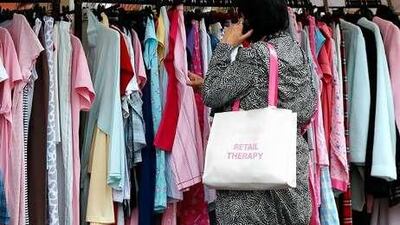British consumers are turning to retail therapy to lift the country out of economic depression. And they seem to be succeeding. Amid warnings of a likely double-dip recession by politicians and pundits, high street spending reached a three-year high last month despite price rises, a recent survey by the business lobby CBI shows.
And retailers remain optimistic that the shopping trend will continue at least for the next three months and stores expressed their strongest hiring intention in more than six years. The news was boosted by the country's official statistics agency, which upgraded its GDP growth estimates for the second quarter to 1.2 per cent, up 0.1 per cent from its initial estimates. It is a tiny rise, but it is also the fastest pace of economic growth in nearly a decade, thanks to strong household spending and a pickup in the construction industry.
"Britons certainly like to go out and shop," says Richard Perks, the research director at Mintel. "Part of the reason is that the recession has not hit consumers hard yet because they have been cushioned by low interest rates." Consumer confidence bounced back sharply last month, according to the GfK/NOP social research index released last Tuesday. It rose four points to minus 18, breaking a downward trend since February.
Most of the population think the economy will improve over the coming year even if their own situations do not. These flickers of optimism may be signs that the economic recovery is gaining traction. Or are Britons just fed up with being fed up with the downturn and the high shopping spirits merely an expression of ennui? Mintel's British Lifestyles survey out last week shows that even last year, in the middle of one of the worst recessions for generations, consumers refused to give up on little luxuries such as electronic gadgets, expensive personal care and pet food and accessories.
Last year, they spent £50.5 billion (Dh286.62bn) on technology items such as iPhones, high-definition TV, laptops and MP3 players, a market that is expected to grow 140 per cent in the next five years. They spent £13bn on hairdressers, make-up and beauty products, and a record £46.2bn on clothes. Believe it or not, one in 10 of the 2,000 people Mintel talked to said they bought "most of their clothing from designer and high-end retailers".
One presumes this lack of thrift indicated a belief that the economic outlook will improve this year. But the economy has remained dire. By extension of logic, life is going to be even tougher next year when value-added tax (VAT) rises to 20 per cent from 17.5 per cent in January and government austerity measures begin to bite. "The fiscal squeeze will increasingly hit public-sector jobs and consumers' pockets. Households already have elevated debt," says Howard Archer of HIS Global Insight.
Consumers may be having the final splurge before the money runs out next year, rash spending that could mean lean times ahead. Lai Wah Co, the head of economic analysis at the CBI, says the broader outlook for consumer spending is uncertain "given the VAT rise next year, subdued pay awards and the feed-through of public spending cuts to job losses". Inflation, which has stubbornly remained above 3 per cent, overshooting the Bank of England's (BoE) target of 2 per cent, is also a concern. Strong consumer spending as retailers reported the fastest pace of price rises in more than eight years adds to further inflationary pressures.
The recent strength of inflation has surprised even the BoE governor Mervyn King, who predicts it will remain high until at least the end of next year. Other data have also put a damper on hopes of recovery soon. The latest BoE figures out this week show mortgage lending has fallen to its fourth-lowest level on record, fuelling fears of a second crash in house prices. One should not put a good shopper down, especially in hard times. But looking at the bigger picture, one should also not read too much into the shopping trend.
Recovery is on the way. We just don't know when. business@thenational.ae

